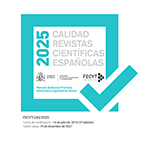Pedagogical translanguaging: A systematic literature review of a new didactic theory and its application in Primary Education classrooms
Abstract
Pedagogical translanguaging is a didactic theory that consists of proposing activities that require the use of the entire linguistic repertoire of the students, in such a way as to improve individual competence in those languages and revalue all languages as valid tools in the communication process. The main objective of this study is to conceptualize pedagogical translanguaging, its origin, benefits, application and presence in educational systems. To accomplish this purpose, a systematic literature review of a corpus of 29 articles, extracted from Scopus (2018-2024), was carried out. From it, it was possible to analyse the contexts of application of translanguaging worldwide nowadays, its link with minority languages, the teachers’ attitudes regarding this didactic theory and the type of practices that are developed in Primary Education in different continents. The results indicate that it is a valid methodology to counteract monolingual ideologies and to revalue minority languages, but also that there are policies and beliefs on the part of the teaching staff that hinder its application in the classroom.
Downloads
Article download
License
In order to support the global exchange of knowledge, the journal Didáctica. Lengua y Literatura is allowing unrestricted access to its content as from its publication in this electronic edition, and as such it is an open-access journal. The originals published in this journal are the property of the Complutense University of Madrid and any reproduction thereof in full or in part must cite the source. All content is distributed under a Creative Commons Attribution 4.0 use and distribution licence (CC BY 4.0). This circumstance must be expressly stated in these terms where necessary. You can view the summary and the complete legal text of the licence.










